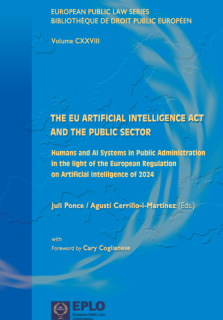
Juli Ponce / Agustí Cerrillo-i-Martínez (Eds.), The EU Artificial Intelligence Act and the Public Sector - Humans and AI Systems in Public Administration in the light of the European Regulation on Artificial Intelligence of 2024 (with Foreword by Cary Coglianese), European Public Law Series / Bibliothèque de Droit Public Européen, vol. CXXVIII, European Public Law Organization (EPLO), Athens, 426 pp., 2025, ISSN: 2308-8648, ISBN: 978-618-5417-17-8
The book “The EU Artificial Intelligence Act and the Public Sector - Humans and AI Systems in Public Administration in the light of the European Regulation on Artificial Intelligence of 2024” includes a Foreword written by USA professor Cary Coglianese, an Introduction by the Editors, Professors Juli Ponce and Agustí Cerrillo-i-Martinez, and ten contributions from different European specialists in relation to the EU Regulation on AI passed in 2024, also known as the Artificial Intelligence Act (or AI Act). The European Union has defined a new legal framework with the new AI Act for the development and use of artificial intelligence in Europe, which is expected to become a global model for regulating this disruptive technology. This new legal framework focuses on being human-centric and respectful of European Union values and human rights while boosting innovation. The AI Act’s purpose is therefore to improve the functioning of the internal market by laying down a uniform legal framework. Furthermore, the AI Act pursues to ensure the protection of health, safety, fundamental rights, democracy, the rule of law and environmental protection. To that end, the AI Act lays down harmonized rules for the placing on the market, the putting into service, and the use of AI systems in the European Union; prohibitions of certain AI practices; specific requirements for high-risk AI systems and obligations for providers and deployers of such systems; transparency rules for certain AI systems; harmonized rules for the placing on the market of general purpose AI models; and rules on market monitoring, market surveillance governance and enforcement. The book considers all those and other related aspects and includes different chapters written by experts in Law, AI and behavioral insights, which analyze the EU Regulation with a transdisciplinary perspective.
*
Juli Ponce is a Professor of Administrative Law at the University of Barcelona, co-director of the Barcelona Chair on Housing Studies, member of the body for the Guarantee of the Right of Access to Public Information of the Parliament of Catalonia (OGDAIP), Director of the Local Law Seminar of the Federation of Catalan Municipalities and Co-director of the Collection of monographs of the Marcial Pons publishing house titled Law, Good Administration and Transparency. He has been Vice-Dean at the Faculty of Law in Barcelona, Director of the Transjus Transdisciplinary Research Institute at the same Faculty and Director of the School of Public Administration of the Catalan Government. He is a member of the European Group of Public Law and the European Network for Housing Research.
Agustí Cerrillo-i-Martínez is a Professor of Administrative Law at Universitat Oberta de Catalunya (Spain). He holds a PhD in Law and a Degree in Law and in Political Sciences. He is member of the Legal Advisory Commission of the Administration of the Generalitat de Catalunya and director of the Revista Catalana de Dret Públic (RCDP) [Catalan Journal of Public Law]. He has been the Ombudsman, the Dean of the Law and Political Sciences School and Programme Director of the Law Degree of the Universitat Oberta de Catalunya.
CONTENTS
Ι. Foreword
by Cary Coglianese
ΙΙ. Introduction
by Juli Ponce / Agustí Cerrillo-i-Martínez
ΙΙΙ. Le Nozze di Giustizia. Interactions between Artificial Intelligence, Law, Logic, Language and Computation with Some Case Studies in Traffic Regulations and Health Care
by Joost J. Joosten / Manuela Montoya García
IV. The Artificial Intelligence Act as a Risk Regulation Tool
by Javier Miranzo Díaz
V. AI for Regulation and the (EU) Regulation of AI
by Nicoletta Rangone / Luca Megale
VI. Preventing Biased Results and Discriminatory Effects of AI Use in Public Administration
by Agustí Cerrillo-i-Martínez
VII. Administrative Transparency and AI. Attempting to Catch a Difficult Horse
by Enrico Carloni
VIII. Artificial Intelligence, Automated Administrative Decisions and Discretionary Powers: The “Human Reserve” and the Human in the Loop in the 2024 European Union Regulation
by Juli Ponce
IX. Some Considerations on the “Human Reserve” and the Human Supervision in the Field of Public Security
by Francisco Luis Pérez Guerrero
X. Red Flags Systems against Corruption. Spanish AI Tools and the Impact of the EU AI Act
by Oscar Capdeferro
XI. Controlling Legally High-risk AI Systems in the European Union: A Challenge for Public Administrations at a National Level
by Wellington Migliari
XII. Artificial Intelligence in the Public Sector: Algorithmic Audit Concomitant
by Eva Mota Sánchez / Mónica García Sáenz
XIII. Curriculum Vitae of the Authors
















